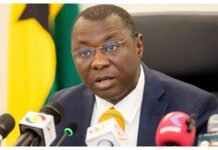
Finance Minister, Seth Terkper, has said the Sinking Fund created last year is playing a critical role in deepening liquidity and bringing down interest rates on government’s bonds.
In a very buoyant mood, Mr. Terkper noted that the government’s ability to raise a 10-year bond at 19percent domestically shows that the market is reacting to the government’s active presence in the secondary bond market backed by the Sinking Fund and its new buyback policy.
“Something must be happening now for us to be doing 19percent and not 24 or 25percent, which was barely three or four months ago,” in reference to the Treasury Bills, two, three and five year bonds raised recently at higher rates.
“What is happening then is, we established a Sinking Fund and we have been in the market with US$133million which we used to buy part of the US$750million which we refinanced twice,” he said.
He explained that using funds from the Sinking Fund to buy back part of the US$750million Eurobond means that bond is now at US$617million and if he continues to use the Sinking Fund and buy back, the markets will pick the signal that Ghana is no longer the country waiting for bonds to mature.
“This is where the Sinking Fund becomes very important in the discussions we are holding. If the markets know that now I have the Sinking Funds of US$100million, average a year, and I borrow for 10 years; I have it at my disposal to do what I wish in the secondary market.
They can calculate that in 10 years I have a billion dollars and if I borrowed US$2billion or whatever, unlike in the past when I did not have the mechanism for buying back, now I can buy back,” he told journalists at a press conference in Accra.
Going forward, the government, through the Ministry of Finance, will be very active in the secondary market, especially when rates drop on bonds, than it used to be, he said.
“Assuming one of my 10-year instruments, which has nine years to go, is selling at a premium but at lower yield and I buy back and cancel, I have paid off part of that debt and saving interest. So, I am saving interest for the next nine years,” he said.
Mr. Terkper noted that with the 15-year Eurobond which was sold at 10.75percent now trading at 8.9125percent, government can go and buy back that bond, at a premium though, but then the bond will be cancelled and the country would make savings on the 10.75percent for the next 14 years.
Use of the 10-year bond
Government, the Finance Minister said, now has two major options in how to utilise the over-subscribed 10-year domestic bond: either use it to finance capital expenditure in the budget or use it to substitute short term bills and bonds with longer term debt.
“I can use the bond to finance a capital budget because I am no longer going to buy Treasury Bills to finance the capital budget or pay for roads. I prefer a 10-year bond so I can buy time to pay for it instead of 90-days where there is always pressure to pay. So I will be selective in what I will be using that money for, if I am using it to support the budget,” he said.
“Now I am changing the policy and taking the proceeds of the 10-year bond of GH¢400million and go to the short end of the market and do not roll over my T Bills which I would have re-financed at 25percent and substitute at 19percent and not at the perpetual 24percent which I would have been paying,” he said.
Mr. Terkper added that this will begin to ease the pressure on the domestic market “because I am no longer coming to the market to buy, because I have redeemed and I am going to be now paying 19percent.”
With the buyback policy backed by a growing Sinking Fund, government is confident it can go into the market, primary and secondary market, and buy bonds, substitute them and extend the tenor to buy time, and then use the long-term fund to finance the budget at 19percent.
with more room and targeting capital expenditure or use it to target Treasury Bill which is trading at 24percent.
“I represent the taxpayer, and high interest means high cost and so my responsibility is to see how cost of debt services will go down. The instrument of Sinking Fund has come in handy for us,” he said.
Reducing rates
He hoped that the Bank of Ghana, which will on Monday, 21st November, 2016, announce a new policy rate, will pick the signal that inflation or no inflation, interest rates can start trending downwards.
With oil prices inching up or additional revenues from the TEN project coming in, as well as the coming onstream of Sankofa next year, Mr Terpker is confident government can achieve a lot more going forward.
Source: BFTonline.com




